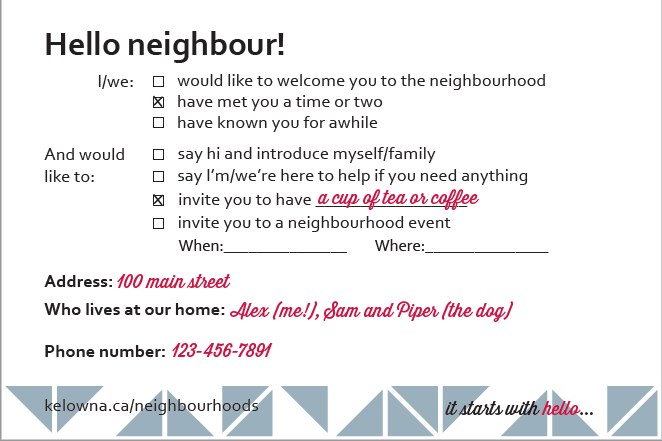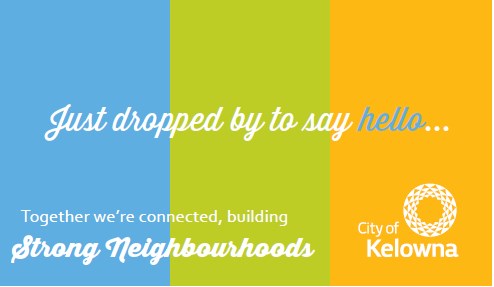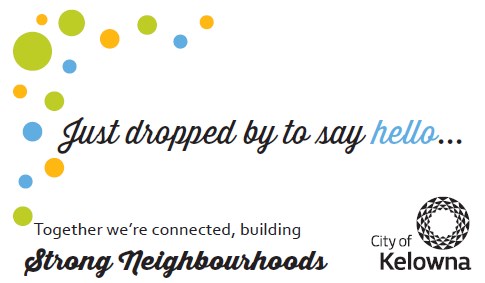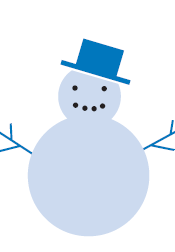Good neighbour tips & resources
Results from the survey we distributed leading up to the creation of our Strong Neighbourhoods program indicated that residents have a desire to get to know their neighbours.
The following tips and resources will help inspire you with ideas on how to reach out and build relationships with your neighbours.
Forming meaningful connections with your neighbours starts by making that initial introduction.
Whether you want to meet your neighbours for the first time or get to know them better, we’ve got some tips for you!
Handshake a week pledge
 Keep it short and sweet! Set aside just 15 minutes a week to introduce yourself to one of your neighbours.
Keep it short and sweet! Set aside just 15 minutes a week to introduce yourself to one of your neighbours.
TIP: keep the conversation short by staying outside or on the doorstep.
Take a stroll...
 Hesitant to knock on your neighbour’s door? Walk through your neighbourhood, smile and say hello to the neighbours you see.
Hesitant to knock on your neighbour’s door? Walk through your neighbourhood, smile and say hello to the neighbours you see.
TIP: the more you practice this, the more “strangers” become “neighbours.”
Find common ground
 Looking for common ground? Start a conversation about your neighbourhood!
Looking for common ground? Start a conversation about your neighbourhood!
TIP: have you seen your neighbours out jogging, gardening or with kids or dogs? Start a chat about that.
Plan a get together
 Invite a group of neighbours to a picnic in the park or morning coffee on your front lawn.
Invite a group of neighbours to a picnic in the park or morning coffee on your front lawn.
TIP: provide name tags for people to use - make it easy to remember people’s names.
Connecting without conversation
 More of an introvert? Drop off a treat and introduce yourself with a short note. Get creative and have some fun!
More of an introvert? Drop off a treat and introduce yourself with a short note. Get creative and have some fun!
IDEAS: a packet of microwave popcorn with an attached note that says, "Just popping by!" or a jar of jam with the note: "If you’re ever in a jam…"
Don't worry! Everyone gets nervous when meeting new neighbours! Try these conversation starters:
A great icebreaker as a way introduce yourself or connect with neighbours you find difficult to meet in person.

Pick and choose your front and back.
Once you’ve formed a connection with your neighbours, reach out to them if you need assistance and make it clear that you’re willing to support them.
Designed for you to connect with your neighbours or to leave messages of support.


Take an interest in the well-being of your neighbours and follow the proper etiquette.
Help clear the way this winter!
Be a snow angel
It’s the neighbourly thing to do—lend a helping hand by clearing snow from a neighbour’s driveway or sidewalk, especially for seniors or those with mobility challenges/
Don't know your neighbour?
Break the ice and show your neighbourliness by shovelling their sidewalk or driveway. They’re sure to appreciate your help!
Nominate your neighbourhood Snow Angel
Have an awesome neighbour who helps you out with snow removal? Nominate them online and they’ll be entered into a prize draw.
For more information, visit kelowna.ca/snowangels.
Do your part to keep your neighbourhood safe.
It’s important to understand the difference between an emergency and non-emergency. Remember, 9-1-1 is for police, fire or medical emergencies when someone’s health, safety or property is in jeopardy or a crime is in progress.
Emergency | Non-emergency: |
| A serious crime has just occurred or is about to occur | Reporting a crime after it has occurred |
| Getting help for someone who is seriously injured or requires immediate medical attention | Reporting stolen, lost or found property |
| A fire, car accident or any other major incident or medical emergency | Reporting suspicious or illegal activities in your neighbourhood after the fact |
| If you feel in danger | Contacting the police officer who attended to a prior complaint |
| When someone else is in danger, or their property is in danger | Obtaining general information from the RCMP |
| Call 9-1-1 | Call the non-emergency line: 250-762-3300 |
Bylaw Enforcement deals with the following issues:
- Excessive noise
- Parking infractions
- Abandoned vehicles
- Panhandling
- Illegal Camping
- Infraction of Parks Bylaws (i.e. smoking, littering, not picking up after your dog)
- Illegal postering, graffiti
- Unsightly premises
City of Kelowna Bylaw
250-469-8686
(Monday to Friday, 8 a.m. – 4 p.m.)
After-hours Bylaw
250-762-3300
Contact your Community Safety Department [email protected] for information related to:
- Neighbourhood crime
- Home & personal safety
- Protecting your personal belongings
- Bike theft prevention
For non-emergency situations, you may contact the following:
Kelowna RCMP
250-762-3300 (24 hours)
Community Policing Office:
Rutland RCMP Office
250-765-6355 (9 a.m. -4:30 p.m. Monday to Friday)
Creating and maintaining a strong neighbourhood presence is an effective way to boost safety and security in your neighbourhood.
How do you maintain a strong neighbourhood presence?
- Visit your neighbourhood park regularly
- Spend time in your front yard as being visible in your neighbourhood can be a crime deterrent
- Get to know your neighbours
- Socialize and have fun in your neighbourhood
- Go for walks in small groups, gather for coffee, potluck picnics, neighbourhood Frisbee or bocce games.
There are huge payoffs for getting to know your neighbours!
When you know your neighbours…
- Your physical and mental wellness are bolstered
- Your personal safety and neighbourhood security are enhanced
- You can save money and time
- Opportunities to be even more environmentally friendly become possible
- There are more opportunities to be social, make a difference locally and have fun!
All this exists just outside your front door!
More benefits
Getting to know your neighbours can significantly increase safety and security in your neighbourhood.
When you know your neighbours, it’s:
- Easier to spot out-of-the-ordinary activity in your neighbourhood
- More likely that your neighbours will tell you about something unusual happening around your home
In an emergency, your neighbours:
- Might be the ones to pass on important information
- Are likely to look out for you and your unique needs
Knowing your neighbours can be beneficial for daily tasks as well. Need to climb up a ladder to wash your windows? Ask a neighbour to hold the ladder and increase your personal safety.
Go meet your neighbor; it can improve - and even save - your life.
Did you know... Knowing your neighbours is associated with a reduced risk of having a heart attack and an overall increase in physical wellness?
- Invite your neighbour to join you for that walk, hike or bike ride. Even if they don’t join you this time, you might learn how they like to be active, which opens up another level of conversation. If they do join you, you might discover that they are the exercise buddy you’ve been looking for.
Positive relationships with our neighbours help create a rich social fabric. This helps to protect us from feelings of isolation and loneliness that are often linked to depression and anxiety.
- While you’re out being physically active, you’re boosting those feel-good endorphins
- If you make a point to stop and talk to your neighbours along the way, you will get to know your neighbours
These face-to-face interactions are the building blocks to neighbourhood belonging!
Get to know your neighbours & save money!
When you get to know your neighbours, you get to know what they’re good at and what they need help with. Discover how you can share or pool your resources.
Ideas:
- You mow their lawn, they help you harvest your vegetable garden
- Share tools rather than buy new tools you will rarely use
- Carpool to work
- Bulk buy groceries
- Swap clothes or children’s toys
- Create a baby/pet/house-sitting co-op
These ideas can save money, decrease waste and reduce your carbon footprint. Want to do more for the environment? Working with your neighbours to plant trees, start a neighbourhood gardening group or clean-up initiative is a great place to start.




